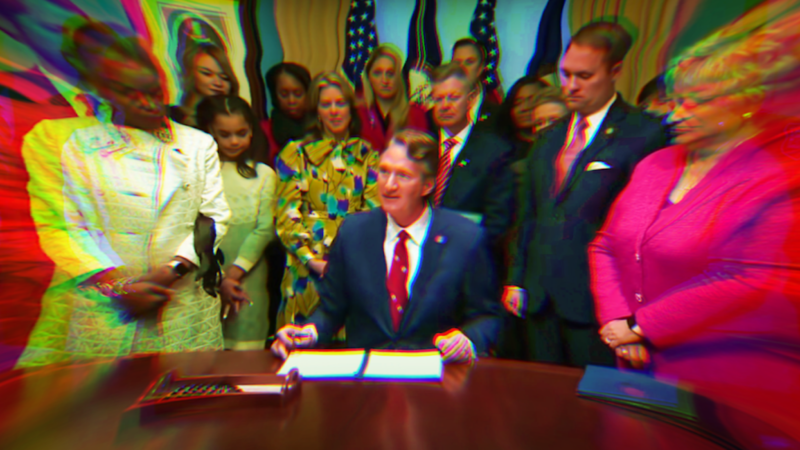Citing Debunked CDC Research, Virginia School Districts Vow To Defy Youngkin on Mask Mandates
The science isn't actually on school districts' side.

On Saturday, newly minted Virginia Gov. Glenn Youngkin, a Republican, declared an end to mask mandates in the state's public schools; parents may now decide whether their children should wear masks.
Youngkin's executive order has been met with furious opposition from public schools. Several districts—including Arlington and Alexandria City Public Schools, which both neighbor D.C.—vowed to openly defy the order, receiving encouragement from White House press secretary Jen Psaki. In response, the governor said he would pursue all legal options to compel schools to let parents decide the mask issue on an individual basis.
There is good reason to move away from district-wide mask mandates. In defense of continuing mandatory masking, education officials cited unpersuasive research from the Centers for Disease Control and Prevention (CDC) that ought to be rejected as the basis for an argument.
Neither Arlington nor Alexandria responded to my request for comment. When reached by The Daily Caller, Arlington Public Schools admitted that their policy of mandatory masking for everyone ages 2 and older came straight from the CDC. (Arlington's first instinct was apparently to refuse comment entirely; a communications staffer for the district told the reporter, perhaps inadvertently, "I recommend not responding to The Daily Caller. It won't get us anywhere.")
Similarly, Alexandria Superintendent Gregory Hutchins (whose own child attends private school) said the district will continue to defer to the CDC's finding that "masks, combined with multiple other ACPS mitigation measures, have been effective in helping to protect the collective health and safety of our students and staff and keep our schools open for in-person learning." Hutchins' letter to the community suggests that the mask requirement might get more stringent, rather than less: He said that he has received shipments of KN95 masks, and the alternative will be double-masking. Nearly two years into the pandemic, the public education bureaucracy's desire to compel all students to vigorously conceal their faces hasn't weakened—in fact, it's growing stronger.
But the CDC's research on schoolwide mask mandates is much less impressive than the agency seems to think. The Atlantic has highlighted numerous problems with its recommendations, which were based on a "profoundly misleading" study of Arizona schools.
It should be noted that other countries are far less militant about masking in schools. The World Health Organization does not advise masks for children ages 6 and under. The European Union recommends that students in K-8 schools be allowed to unmask.
"Scientists generally agree that, according to the research literature, wearing masks can help protect people from the coronavirus, but the precise extent of that protection, particularly in schools, remains unknown—and it might be very small," wrote The Atlantic's David Zweig. "What data do exist have been interpreted into guidance in many different ways."
In the face of the much, much more contagious omicron variant of COVID-19, the benefits from masking might be even smaller. Omicron has managed to evade mitigation efforts almost entirely; thankfully, the disease appears less virulent than previous strains, and vaccinated individuals should expect to have a mild bout with it. Healthy young people also have little to fear, rare exceptions aside.
None of that is to say there's no benefit from wearing a mask. But district officials' policy of deciding the matter on behalf of all students is difficult to justify. Indeed, throughout the pandemic, local politicians have often forced schools to be the most masked environments. The few times that D.C. Mayor Muriel Bowser has relaxed the city's mask mandate, she has kept it in place for schools. No one's faces are more concealed than young people's.
The best thing to do would be to empower families to claim whatever money is being allocated to public schools on behalf of their children and use it to fund an educational option that fits their individual needs. In the current, less-than-ideal world, public school officials who deny choice to families should at least concede that the science isn't actually on their side.


Show Comments (384)